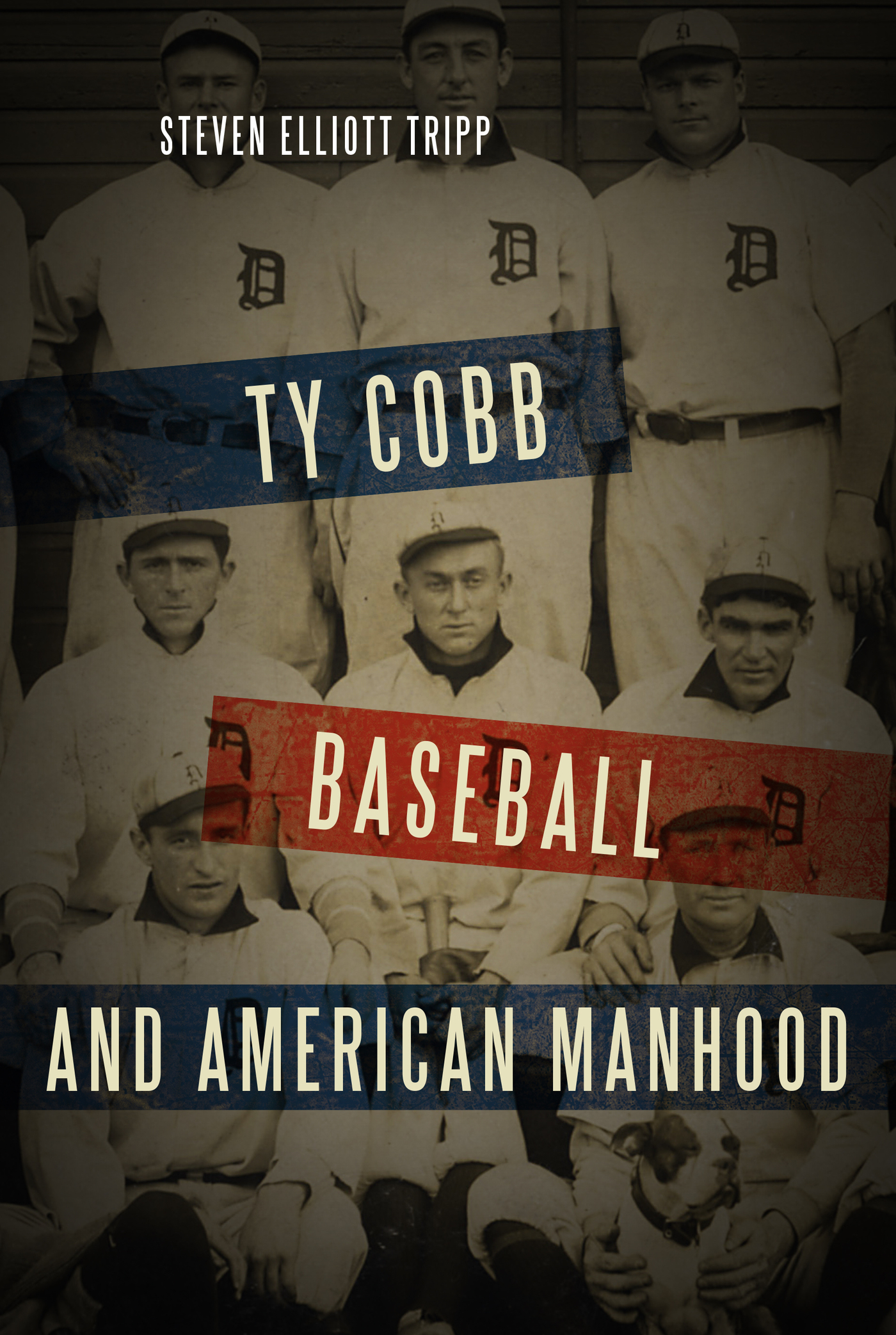Ty Cobb, Baseball, and American Manhood
Ty Cobb, Baseball, and American Manhood
Steven Elliott Tripp
ROWMAN & LITTLEFIELD
Lanham Boulder New York London
Published by Rowman & Littlefield
A wholly owned subsidiary of The Rowman & Littlefield Publishing Group, Inc.
4501 Forbes Boulevard, Suite 200, Lanham, Maryland 20706
www.rowman.com
Unit A, Whitacre Mews, 26-34 Stannary Street, London SE11 4AB
Copyright 2016 by Rowman & Littlefield
All rights reserved. No part of this book may be reproduced in any form or by any electronic or mechanical means, including information storage and retrieval systems, without written permission from the publisher, except by a reviewer who may quote passages in a review.
British Library Cataloguing in Publication Information Available
Library of Congress Cataloging-in-Publication Data
Names: Tripp, Steven Elliott, 1956- author.
Title: Ty Cobb, baseball, and American manhood / Steven Elliott Tripp.
Description: Lanham, Maryland : Rowman & Littlefield, [2016] | Includes bibliographical references and index.
Identifiers: LCCN 2016004996 (print) | LCCN 2016015725 (ebook) | ISBN 9781442251915 (cloth : alk. paper) | ISBN 9781442251922 (Electronic)
Subjects: LCSH: Cobb, Ty, 1886-1961. | Baseball players--United States--Biography. | Baseball--Social aspects. | Masculinity in sports.
Classification: LCC GV865.C6 T75 2016 (print) | LCC GV865.C6 (ebook) | DDC 796.357092 [B] --dc23
LC record available at https://lccn.loc.gov/2016004996
 TM The paper used in this publication meets the minimum requirements of American National Standard for Information Sciences Permanence of Paper for Printed Library Materials, ANSI/NISO Z39.48-1992.
TM The paper used in this publication meets the minimum requirements of American National Standard for Information Sciences Permanence of Paper for Printed Library Materials, ANSI/NISO Z39.48-1992.
Printed in the United States of America
In memory of my mother,
Jeanette Elliott Tripp
Preface
Several years agomore than I care to rememberI decided to write what I hoped would be an instant gratification sort of an essay: an analysis of how Ty Cobbs ethic of honor informed his behavior. Almost immediately, I realized I could not make sense of Cobbs behavior without first understanding more about the social and cultural contexts in which he thrived, especially the values and ideals of the other participants in Cobbs many on- and off-field dramasnamely the players and fans who served as both his adversaries and audience. This posed a problem, however, because few scholars had paid much attention to either group. As a result, my little project turned into a big project and my quest for instant gratification evaporated. In all, this manuscript has taken me about twice the length of the average major league baseball career to prepare. Ironic, eh? Not that Im complaining. Cobb captivated me from the start; he was a remarkable and complex individual.
Before beginning, I need to come clean about a few matters regarding presentation and emphasis. First, this is not a biography per se. Rather, this is a work of social and cultural history. Although I provide biographical information about Cobb, beginning with his childhood and youth in rural Georgia, I do not try to offer a year-by-year chronicle of his baseball exploits or his life more generally. Nor do I examine every facet of his life; for example, I pay scant attention to his private life. Readers interested in such matters would do well to consult one of the many excellent traditional biographies. Instead, I opted for a more analytical approach that gives primacy to questions of causation, contexts, and consequences. One of these questions is why Cobb acted as he did. That is, why was he willing to sacrifice almost everythinghealth, friendships, popularityto be the best player in the game? Remarkably, few Cobb biographers have examined this issue with any sort of systematic rigor. Most have feebly resorted to psychological interpretations of dubious diagnostic validity. They claim Cobb was either paranoid, bipolar, manic-compulsive, or some combination of all three. The problem with such interpretations is twofold. First, those who have made these assertions have absolutely no expertise in psychiatry. Second, the interpretations are ahistorical in that they hold Cobb to standards of emotional normality that may not have existed when he was at his peak in the early twentieth century. I rest my analysis on the firmer ground of what we actually know about Cobb and his era. I suggest Cobbs childhood in the rural South played a formative role in his later public behavior. Specifically, I argue the men in Cobbs lifehis father, two grandfathers, neighbors, and friendsmodeled a standard of manhood that placed primacy on family honor, personal autonomy, nerve, and will. These values remained central to Cobb from childhood, through his baseball career, and beyond.
A second question that receives considerable attention here concerns Cobbs remarkable and enduring popularity. At the height of his career, a period that began in 1907 and lingered into the early 1920s, Cobb was easily the most popular player in the game. Why was this so? How did this combative and egocentric Southerner from the backwoods of Georgia become professional sports first true national celebrity? Why did the sporting public, that is to say working- and middle-class urban men, find this mercurial man-child so captivating? More than any single player, Cobb turned baseball into a national gamea sporting event that captured the public imagination. Along the way, he delighted, enraged, alienated, entranced, and at all times fascinated and entertained fans and journalists alike. How he did this and what his story tells us about broader social and cultural currents in American life is a primary focus of this work. I am also interested in the flipside to this question: why did so many of his peers, both teammates and opponents, detest Cobb? To answer this, I examine the work culture of early twentieth-century ballplayers. Ultimately, this means I devote as much attention to fans, players, managers, and the press as I do to Cobb himself. Cobb was a fascinating individual in his own right, but he becomes even more so when placed in the social and cultural milieu of early twentieth century America. That is what I try to do here.
Years ago, when I first started this project, I told an archivist very familiar with Cobb (Im sorry; I cant remember his name) what I planned to do. He sighed and replied, Well, finally, someone is asking the right questions. Now that my work is completed, I hope I also provided the right answers.
Acknowledgments
My journey to Ty Cobb and early twentieth-century baseball began with a National Endowment for the Humanities Summer Grant in which I first began to explore the mindset of post-Reconstruction Southerners. I never imagined my intellectual journey would lead to Cobb and baseball, but somehow that is what happened. A former student, Angela Newcomb, helped me to do much of the initial research on Cobb. Her findings piqued my interest and inspired me to continue. I shared my early research in a variety of different forums. Two proved especially beneficial. I am especially grateful to the incisive criticisms of two anonymous readers for an article I published in The Journal of Social History. Thanks, too, to the Journals editor, Peter Stearns for his early encouragement. I am also grateful to James Gates, Library Director of the National Baseball Hall of Fame and Museum for giving me an opportunity to share my ideas at the Halls Twenty-First Cooperstown Symposium on Baseball and American Culture (2009). The paper, Ty Cobb and the Culture of Honor, was accepted for publication in
Next page
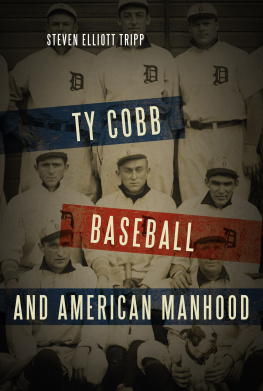
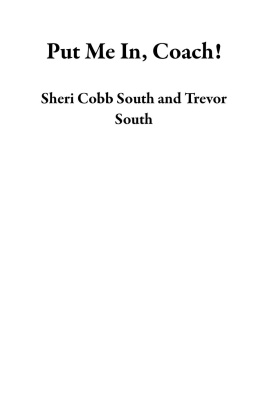


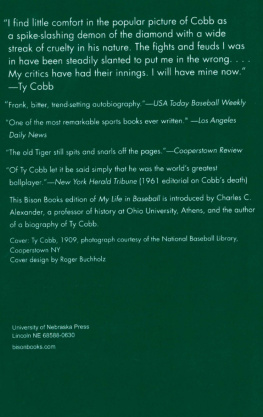
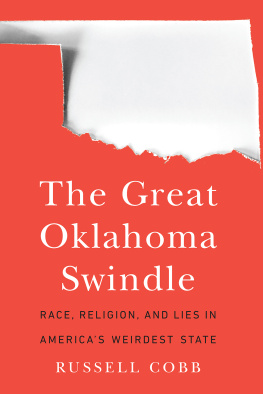
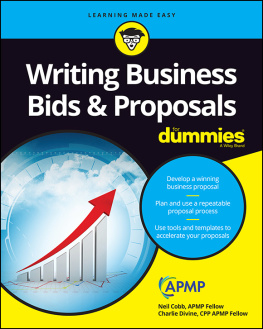
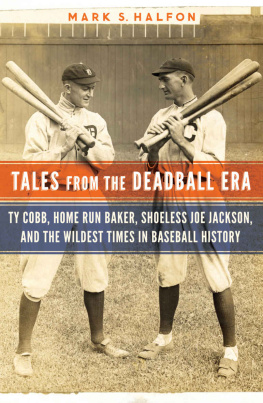
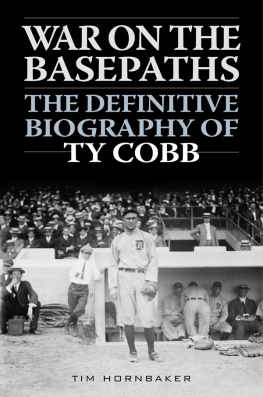
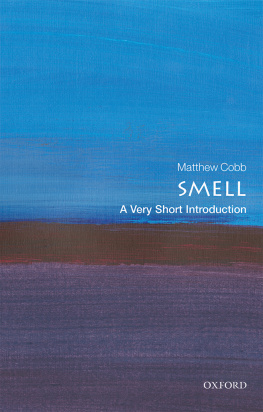
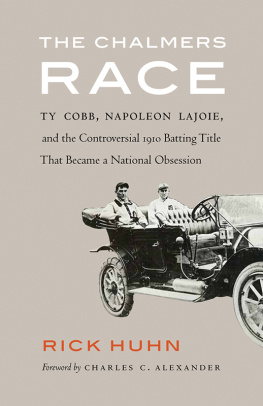
 TM The paper used in this publication meets the minimum requirements of American National Standard for Information Sciences Permanence of Paper for Printed Library Materials, ANSI/NISO Z39.48-1992.
TM The paper used in this publication meets the minimum requirements of American National Standard for Information Sciences Permanence of Paper for Printed Library Materials, ANSI/NISO Z39.48-1992.